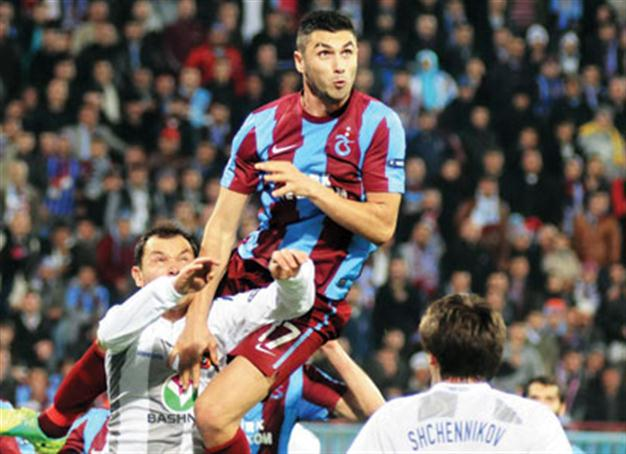
If the Balkan League is realized, Champions League matches between Trabzonspor and CSKA Moscow might be revisited on a different level. DHA photo
European football could undergoing a radical revamp in the coming years as continental powerhouses, as well as leading Eastern European sides, mull whether to form their own supranational competitions.
While the G14, the group formed by the top football clubs on the continent, has long desired to break away from the Champions League to generate even more revenue for their teams, leading Balkan clubs are now aiming to form their own competition as well.
Barcelona President Sandro Rosell said at a meeting in Qatar earlier this week that Europe’s top leagues should be reduced from 20 clubs to 16 and that serious changes to the Champions League should be made.
“We want the Champions League under UEFA’s umbrella but also want UEFA to hear our demands for more revenue,” Rosell said. “We would like a Champions League with more teams so that, one day, we can play a Barcelona vs. Manchester United Champions League game on a Saturday or Sunday.”
As scrapping the national leagues is not on the immediate horizon due to long-term broadcasting deals, the top clubs may force UEFA to agree to a more lucrative format based on their profits.
Meanwhile, officials unveiled plans for an Eastern European League on Nov. 15 to try and improve the financial viability of clubs in the region and raise standards.
“We have repeatedly discussed the situation and problems in the region and it’s widely recognized that Eastern European football is increasingly lagging behind football in Central and Western Europe,” Dimitar Borisov, president of CSKA Sofia, said during a conference in the Bulgarian capital to present the idea.
“Our clubs’ access to the UEFA Champions League and the Europa League is very difficult,” he said. “Only a few teams from the region participate in the group stages of these cups and there are limited opportunities for participation in competitive international games for most of the clubs in the region.”
Raising standards in Eastern Europe
Top regional clubs, including Sofia rivals CSKA and Levski, Belgrade giants Red Star and Partizan, Romania’s Dinamo Bucharest and Russia’s Spartak Moscow failed to qualify for the group phase of the European competitions this season.
“I’m very happy to be here as we fully support the idea,” said Dinamo Bucharest’s Adrian Alexandrescu, who also represented several other Romanian clubs.
Delegates said they would seek the support and assistance of Europe’s governing body.
Borisov said the plan was to “form a voluntary association that will work in coordination with the national football associations under the supervision of UEFA, in accordance with their regulations and rules.”
“It’s the very first meeting and we’re still discussing details but we informed UEFA about our plans. I don’t see a reason for UEFA not being involved since we hope to create a financially stable and attractive tournament,” Borisov said.
The next meeting is likely to be held in Belgrade on Nov. 25, a day before the derby between Red Star and Partizan. Dinamo Bucharest also said they would host a meeting in December.
“We don’t want to oppose other European tournaments,” said Vladan Lukic, president of Red Star Belgrade. “We would like to find an alternative and help our players and fans become involved in big games throughout the whole year.”
The idea for a regional Balkan League was first raised several years ago but now teams from Russia, Ukraine, Moldova and Greek Cyprus are also interested. Talks with Turkish and Greek clubs are scheduled for next week. Turkey’s Bursaspor was invited to the meeting, but the club president could not make it to the conference due to illness, according to reports.
Under the initial plan, the competition would be run from September to May with 32 teams competing. There would be eight groups of four teams at the start, followed by knockout rounds. Clubs competing in the Champions League and the Europa League, and who fail to make it beyond the group stages, would be allowed to join the tournament in the elimination rounds.
An additional Reuters report was used in this story.